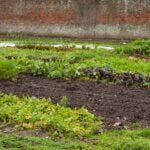The presence of bears in vegetable gardens has become a growing concern for gardeners and wildlife authorities alike. As urban development encroaches on bear habitats, encounters between humans and bears have become more common, leading to increased incidents of bears raiding vegetable gardens. Understanding the behavior of bears and taking preventative measures are crucial in minimizing the impact of these encounters.
As bear populations continue to expand and adapt to changing landscapes, it is important for gardeners to be informed about the potential risks and strategies for protecting their vegetable gardens from these large predators. From understanding what attracts bears to vegetable gardens to implementing non-lethal deterrents and even bear-resistant fencing, there are various steps that can be taken to minimize conflicts with bears while still allowing them to coexist with humans.
In this article, we will explore the behavior of bears that lead them to vegetable gardens, the impact they have on crops, as well as effective preventative measures that can be taken. By understanding the complexities of human-bear interactions and working in harmony with wildlife authorities, we can strive for a balance between wildlife conservation and the protection of our valuable vegetable gardens.
Understanding Bear Behavior
Bears are often attracted to vegetable gardens due to the abundance of food and nutrients available. Their keen sense of smell allows them to detect ripe fruits, vegetables, and even the scent of compost from a considerable distance. Additionally, bears are opportunistic foragers and will take advantage of any easy food source they come across.
There are several key factors that make vegetable gardens particularly appealing to bears. These include the presence of:
- Ripe fruits and vegetables
- Compost piles
- Trash cans or bins with food scraps
A bear’s search for food is also influenced by seasonal cycles, with higher activity in late summer and fall as they try to consume as many calories as possible before entering hibernation. This means that vegetable gardens are especially vulnerable during these times, increasing the chances of encountering bears.
To further complicate matters, human development continues to encroach upon bear habitats, leading to increased interactions between bears and humans in residential areas where vegetable gardens are frequent targets for foraging. As such, it is essential for gardeners to understand what attracts bears in order to implement effective preventative measures.
The Impact of Bears on Vegetable Gardens
Bears are known for their voracious appetite, and unfortunately, vegetable gardens are not exempt from their culinary adventures. When bears make an appearance in a vegetable garden, the impact can be significant, causing damage and resulting in losses for the gardeners. Let’s take a closer look at the specific ways in which bears affect vegetable gardens.
The presence of bears in vegetable gardens often leads to extensive damage to crops and plants. These powerful creatures can easily trample through rows of vegetables, breaking stems and uprooting plants as they search for food. Additionally, bears are known to have a particular affinity for certain crops, such as corn and berries, which they may consume or destroy in their quest for sustenance.
Losses in a vegetable garden due to bear activity can be both frustrating and costly for gardeners. Not only do they have to contend with the physical destruction of their hard work, but they also face the prospect of reduced yields or complete crop loss as a result of bear interference. This can be especially disheartening for those who rely on their vegetable gardens for sustenance or as a source of income.
To mitigate the impact of bears on vegetable gardens, it is crucial for gardeners to employ preventative measures and non-lethal deterrents. By taking proactive steps to protect their crops from bear incursions, gardeners can minimize the potential damage and losses caused by these large omnivores.
- Installing bear-resistant fencing
- Utilizing motion-activated deterrents
- Harvesting crops promptly
By implementing these strategies, gardeners can create a more secure environment for their vegetables while also promoting coexistence with bears in their natural habitat.
Preventative Measures
Bears are naturally attracted to vegetable gardens due to the abundance of food available. To keep bears away from your garden, it is essential to understand their behavior and take preventative measures. One effective way to deter bears from your vegetable garden is by removing any other potential food sources that may attract them, such as bird feeders or compost piles. By eliminating these attractions, you can significantly reduce the likelihood of bears visiting your garden.
Another important preventative measure is proper waste management. It is crucial to securely store all garbage and food waste in bear-resistant containers to prevent attracting bears to your property. In addition, using noise-making devices, like wind chimes or motion-activated alarms, can help scare away bears when they come near your vegetable garden.
Installing electric fencing around your vegetable garden can also be an effective way to keep bears at bay. Electric fencing has been proven to deter bears from entering properties and causing damage to gardens. It is important to regularly check and maintain the electric fence to ensure its effectiveness in keeping bears away.
By implementing these preventative measures, you can create a safe environment for both your vegetable garden and local wildlife while minimizing the risk of bear encounters as much as possible.
| Preventative Measure | Effectiveness |
|---|---|
| Remove other food sources | Significantly reduces likelihood of bears visiting the garden |
| Proper waste management | Prevents attracting bears to the property |
| Installing electric fencing | Deters bears from entering properties and damaging gardens |
Non-Lethal Deterrents
When it comes to keeping bears out of vegetable gardens, there are several non-lethal deterrent techniques that can be effective in scaring bears away. One popular method is to use loud noises to scare off bears, such as banging pots and pans together or using air horns.
Bears have sensitive hearing and are often startled by loud sounds, causing them to retreat from the area. Additionally, motion-activated lights or sprinkler systems can also startle bears and discourage them from entering a garden.
Another non-lethal deterrent that has been found to be effective is the use of strong scents that are offensive to bears. Ammonia-soaked rags or cotton balls with strong-smelling essential oils, such as peppermint or cinnamon, can help deter bears from entering vegetable gardens. Bears rely heavily on their sense of smell, so unpleasant odors can be highly effective in keeping them away.
It’s important to note that while non-lethal deterrents can be effective in scaring bears away from vegetable gardens, they are not foolproof. It’s always best to combine these methods with other preventative measures, such as bear-resistant fencing and removing attractants like ripe fruit or food scraps. Working with wildlife authorities to develop a comprehensive plan for bear management is crucial in addressing persistent problems with bears in vegetable gardens.
| Non-Lethal Deterrent Techniques | Effectiveness |
|---|---|
| Loud noises (i.e. pots and pans) | Effective in startling and scaring away bears |
| Motion-activated lights/sprinkler systems | Can startle bears and discourage them from entering garden areas |
| Strong scents (i.e.ammonia-soaked rags/essential oils) | Deters bears by using their highly sensitive sense of smell |
Bear-Resistant Fencing and Garden Design
Choosing the Right Fencing
When it comes to protecting your vegetable garden from bears, choosing the right fencing is crucial. Bear-resistant fencing is typically at least 5 feet tall and made of sturdy materials like metal or heavy-duty plastic.
It’s important to ensure that the fencing doesn’t have any gaps or weak points that bears could exploit to gain access to the garden. Additionally, burying the bottom of the fence several inches into the ground can help prevent bears from digging under it.
Garden Design Considerations
In addition to bear-resistant fencing, consider the layout and design of your vegetable garden. Avoid planting directly next to forested areas where bears are more likely to roam. Instead, create a buffer zone between the garden and any natural bear habitats. Planting noisy vegetation such as sunflowers or installing motion-activated deterrents like sprinklers can also help deter bears from entering the garden.
Maintaining a Clean Garden Environment
Bears are often attracted to vegetable gardens by the scent of ripe produce. To minimize this attraction, promptly remove any fallen fruit or vegetables from the ground and harvest ripe crops as soon as possible. Additionally, properly disposing of compost and avoiding leaving pet food outdoors can help reduce odors that may draw bears to your property.
By implementing these strategies for bear-resistant fencing and garden design, you can create a fortress for your vegetables that significantly reduces the risk of damage by bears. Working in conjunction with other preventative measures, such as non-lethal deterrents and collaboration with wildlife authorities, you can protect both your vegetables and local bear populations in a sustainable manner.
Working With Wildlife Authorities
Seeking Professional Assistance
If bears continue to be a persistent problem in your vegetable garden despite your best efforts to deter them, it may be time to seek assistance from wildlife authorities. These professionals have the expertise and resources to handle human-wildlife conflict situations effectively and safely. Contact your local wildlife agency or conservation department to report the issue and seek guidance on how to deal with bears in your area.
Understanding Local Regulations
Before taking any action regarding the bears in your vegetable garden, it’s important to understand the regulations and laws that apply to wildlife management in your area. Depending on where you live, there may be specific guidelines for dealing with bears, including when and how they can be removed or relocated. Wildlife authorities can provide valuable information about these regulations and help you navigate the legal aspects of bear management.
Collaborating on Solutions
When working with wildlife authorities to address bear problems, it’s essential to collaborate on finding sustainable solutions that prioritize both human safety and wildlife conservation. This may involve exploring options for habitat modification, such as removing attractants or creating buffer zones between bear habitats and residential areas. By working together with knowledgeable professionals, you can find effective long-term strategies for managing bear interactions in your vegetable garden while respecting the natural behavior of these animals.
Conclusion
In conclusion, the issue of bears in vegetable gardens poses a significant challenge for both gardeners and wildlife conservation efforts. The presence of bears can result in substantial damage and losses for vegetable growers, leading to frustration and financial setbacks. However, it’s important to remember that bears are a vital part of our natural ecosystem and their protection is crucial for maintaining biodiversity.
While it may be enticing to resort to lethal measures to eliminate the bear threat, there are numerous non-lethal deterrents and preventive strategies that can effectively keep bears away from vegetable gardens. Implementing measures such as secure fencing, planting certain types of plants that repel bears, or utilizing noise-making devices can help deter these curious animals without causing harm to them.
Additionally, collaborating with wildlife authorities can provide valuable insights and assistance in managing persistent bear problems in a responsible and ethical manner.
Ultimately, finding a balance between protecting vegetable gardens while also respecting the presence of bears in their natural habitat is essential. By taking proactive measures to deter bears without causing harm, we can strive towards coexisting with these magnificent creatures while safeguarding our precious vegetable crops. It’s crucial that we continue to seek solutions that not only protect our gardens but also support the conservation of wildlife, including the majestic bears who inhabit our ecosystems.
Frequently Asked Questions
Do Bears Bother Vegetable Gardens?
Bears can definitely bother vegetable gardens, especially if they are attracted to the smell of ripening fruits and vegetables. They have been known to raid gardens, causing damage to crops and property.
How Do I Protect My Garden From Bears?
To protect your garden from bears, you can consider installing a sturdy fence around the perimeter. Electric fencing or motion-activated deterrents can also be effective in keeping bears at bay. Removing any potential food sources for bears can also help discourage them from entering your garden.
What Smells Will Keep Bears Away?
Bears have a very keen sense of smell, so there are certain scents that can help keep them away from your garden. Ammonia, vinegar, or bleach mixed with water and sprayed around the garden can deter bears due to the strong odor.
Additionally, bear-specific repellents containing ingredients like pepper spray or capsaicin can also be effective in keeping them away.

If you’re looking to get into vegetable gardening, or are just looking for some tips on how to make your current garden better, then you’ve come to the right place! My name is Ethel and I have been gardening for years. In this blog, I’m going to share with you some of my best tips on how to create a successful vegetable garden.





